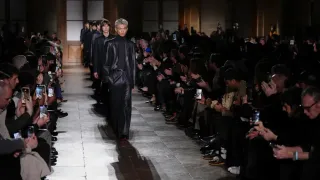November 25, 2017
Avant-Garde Take on Dickens Classic Has Queer Influence
Michael Nugent READ TIME: 4 MIN.
San Francisco's Theatre of Yugen is bringing back its critically acclaimed work "A Noh Christmas Carol," beginning December 1, with a queer twist.
Originally premiering in 1993, this adaptation, written by Theatre of Yugen founder Yuriko Doi, utilizes the traditional Japanese theater forms of noh, ky?gen, kabuki, and the avant-garde dance form butoh to retell the Charles Dickens classic.
This year's production features LGBTQs in leading and supporting roles and is directed by a gay man. Other LGBT people are also involved in the production, including Jacob Ritts, a queer Jewish man who plays Mashima, and Cassie Barnes, a queer woman who is the production's lighting designer.
The story is transported to the early Meiji era Japan, the parallel period to Victorian England. Ebezo Sukurooji (Ebenezer Scrooge) receives a visit from his deceased business partner Jakube Mashima (Jacob Marley), warning him to change his miserly ways or be doomed to linger forever as a hungry ghost. The miraculous intervention of the Ghosts of Christmas Past, Present, and Yet-To-Come take Sukurooji on a wondrous journey through life and time in a profound attempt to remind him that life exists far beyond the numbers and figures of business.
This story of redemption, with its moments of otherworldly magic and mystery, make for a perfect parallel to classical noh drama; the living and the ethereal coexist in a delicate and beautiful liminal space that so perfectly evokes y?gen, or profound grace.
"The world of Noh is unlike anything we get to experience in Western theater," said artistic director Nick Ishimaru, a gay man who lives in San Francisco. "It is a liminal space where spirits come and go, and the corporeal interact freely with the phantasmal. As a theater form, it relies on physicalized conventions to contain this liminal space. I find training in Noh to be highly meditative. It assists me in being aware of my entire body and encourages me to feel every small movement as I move through space."
In adapting the work to Japan, "A Noh Christmas" explores a more Buddhist, spiritual take on the familiar tale.
"Sukurooji is the one who's suffering is being averted through the intervention of his friend Mashima and the Ghosts of Christmas," said Ishimaru. "Sukurooji's attachment to material wealth, his hoarding of money and refusal to do anything with it, is his source of attachment, and, ultimately, will be his source of suffering. Mashima is seeking a release from his suffering as well, that only the redemption of Sukurooji can accomplish. His lesson is that we must always care for one another, always value our human connections beyond the trappings of the world. Community must be embraced to escape eternally wandering the Earth as a hungry ghost."
Actor Shannon Davis, a bi and queer woman, will play Sukurooji.
"I am proud that I get to perform a role not often open to women," Davis said in an interview. "And doubly proud that I'm able to perform it in a Kabuki style, whose tradition forbids women from performing at all.
"Kabuki and Kyogen have clear, strong archetypal caricatures, just like the Dickens stories; making it a good fit," she said. "For example, in Kabuki, we have the Aragoto (rough style of samurai) character. Applying this style to my performance creates an old, grisly, financial warrior Scrooge. What is fascinating is just how familiar this Scrooge feels, even to Western audiences with no Japanese theater experience."
Explorations of the collaborators' diverse cultural backgrounds led to moments of symbiosis.
"I'm part Native American (Ojibwe and Potawatomi)," said Davis. "There are surprising similarities between my cultures and traditional Japanese stories, animal imagery, spirituality, and music. Nick and I have had fun sharing the similarities of our cultures with each other. We're hoping to collaborate in the future on a project that focuses on the intercultural nature of tradition and spirituality."
Ishimaru said he's a fourth generation half-Japanese American.
"Between my identities as a non-white citizen and a queer person who was not totally gender conforming, all of my life I've felt like I occupy a liminal space, lingering somewhere between American and outsider," he said. "As a queer person, I find my queerness encourages me to utilize gender to full effect when casting. In 'A Noh Christmas,' having a gender-bent casting has opened up new readings on the nature of community."
The story is also deeply informed by the current crises in the world.
"Dickens wrote in a time of great economic and social change in England," said Davis. "He saw the heartless aristocracy and rising merchant class profit on the backs of the less fortunate. In these stories, he reminds us that true riches are found in human connections and kindness, not in material wealth or gain."
Davis said that the lessons remain relevant today.
"With the current political climate of wealth before all else, we would do well to remember that we are all connected. You may see some similarities between Scrooge and current political figures," she said.
Ishimaru noted, "A Noh Christmas Carol' is a reminder to reconnect to our communities, be they social, familial, or economic. This story is not just a literal wake-up call to one man to become altruistic; it is a reminder that we are all on this journey through life together and in times of crisis, our most crucial duty is to be our best selves, both for the sake of others and ourselves."
"A Noh Christmas Carol" will run December 1-24 (Friday-Sunday) at Theatre of Yugen, 2840 Mariposa Street in San Francisco. Tickets are $40 general, $50 VIP (includes drinks). For student discounts, contact the box office. For more information and to purchase tickets, go to http://www.theatreofyugen.org .






